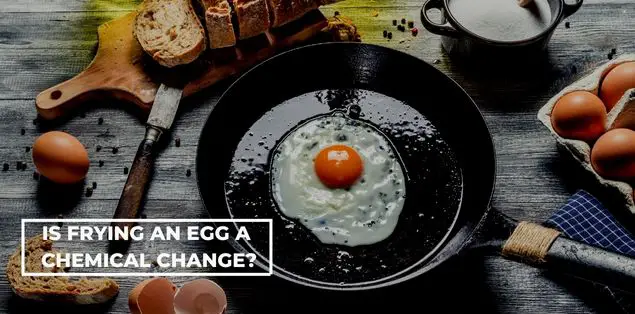Is frying an egg a chemical change? Both chemists and non-chemists have strong views on this matter.
Let’s find out the answer!
Is Frying an Egg a Chemical or Physical Change?
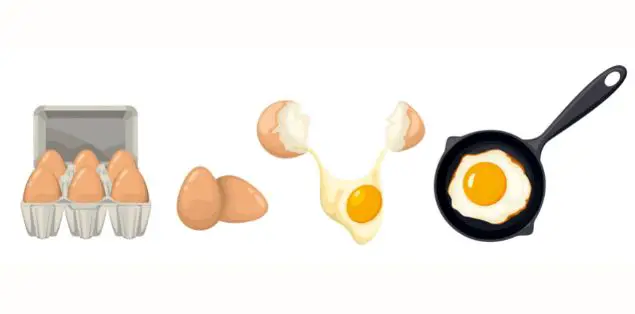
To understand whether frying an egg is a chemical or a physical change, you must first be clear about the physical and chemical changes.
Chemical Changes
When a chemical reaction occurs, one chemical substance changes to another or many other chemical substances. When this occurs, it is either completely impossible or very difficult to undo the alteration.
When you burn wood, for instance, there is a change in its chemical composition due to the heat. This is because the heat and flames consume the wood, reducing its overall volume. This results in it becoming black before deteriorating further into ash and smoke. In addition, this will release heat, light, and sound.
Physical Changes
The state or shape of an item may undergo transformation that is referred to as a physical change. However, the composition of the transforming substance remain the same. Moreover, the physical change may either be permanent or reversible, depending on the circumstances.
When subjected to heat, the transformation in water is an example of a physical change. The solid state of water loses its structure and transforms into liquid and gas. On the other hand, you may reverse this process. This is evident when water transforms from a liquid to a solid when it freezes or when steam transforms back into liquid after it is cooled.
Is Frying an Egg a Chemical or Physical Change?

Chemical change.
Changing the egg’s temperature by frying it results in a chemical reaction. During the frying process, the heat denatures the proteins, which causes a change in both their characteristics and overall constitution.
When you fry an egg, the egg white will transform from having the consistency of a transparent, gooey liquid to a solid. In contrast, the egg yolk will continue to have its original consistency.
Eggs may undergo several chemical transformations when subjected to heat, but this one is the most common. For example, in baking, you use eggs as a bonding material. Therefore, they are no longer in a state the makes them recognizable.
The heat generated during the frying process irreversibly alters the egg’s molecular structure. This energy then gets transferred to the egg’s constituents.
When fried, an egg’s protein undergoes a process called denaturing when you expose it to high heat for an extended period. This causes the egg’s protein to alter its consistency and look permanently.
The liquid transforms into a solid, and the “white” of the egg, which was previously almost completely transparent, changes to take on a white color instead. The cooked egg’s characteristics differ from those of the uncooked egg. These modifications are irreversible, and you cannot roll them back.
Why Is Frying an Egg a Chemical Change?
An egg undergoes a chemical change when you fry it because the high temperatures required to fry it create an oxidation process that produces free fatty acid. This occurs when you heat oil and egg to high temperatures. Additionally, frying results in the eggs losing their water content and absorbing lipids throughout the process.
Whole eggs absorb 73% of the oil during the frying process, while scrambled eggs absorb 88% of the oil. Also, eggs may lose up to 12.5% of their original water content during frying.
Understanding how heat alters the molecular structure of food is necessary to explain the chemical transformations that take place during cooking.
Because heat makes molecules travel quicker, they are more likely to collide with one another than if their speeds were lower. This increases the likelihood of unwanted side effects.
These collisions form new compounds, referred to as “fission” products. These compounds are not present in a raw egg or dishes that incorporate a raw egg, such as mayonnaise or custard.
For instance, fried eggs have a unique aroma compared to boiled eggs. During these collisions, a number of the bonds between the atoms that make up these molecules will “crack,” meaning that they will separate.
What Is the Chemical Reaction When Cooking an Egg?
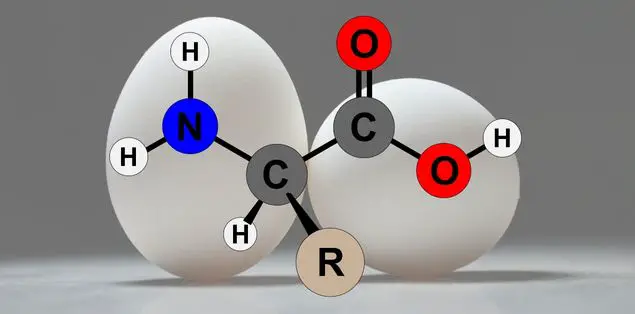
Protein is one of the first components you will discover if you break through an egg shell. Protein makes up around 12% of the egg white, whereas the egg yolk contains approximately 16% of the total protein. This indicates that any change to the structure of these proteins will result in a major change to the structure of the egg.
Like all other proteins, those egg proteins are composed of long chains of amino acids. This is true for all proteins. At the moment, the proteins are present in their natural form. We also refer to this as their “native” state. When a protein is in its natural condition, its constituent amino acids fold in a very particular pattern.
This pattern gives the protein its shape, and it is this structure that, among other things, determines the protein’s qualities. The way it reacts to water is an important aspect in the creation of its natural form.
Hydrophilicity refers to a protein component’s preference for being in the surrounding water. In contrast, other components are hydrophobic, which indicates that they will constantly want to avoid being in the presence of water.
The portions of the molecule drawn to water will be present on the molecule’s surface. In contrast, the portions of the molecule that are reluctant to interact with water will be tucked away inside the protein. This interaction, along with many others, will retain the protein in its form until you begin boiling your eggs. Until then, you won’t be able to start cooking your eggs.
Do Chemical Changes Harm the Eggs You Consume?
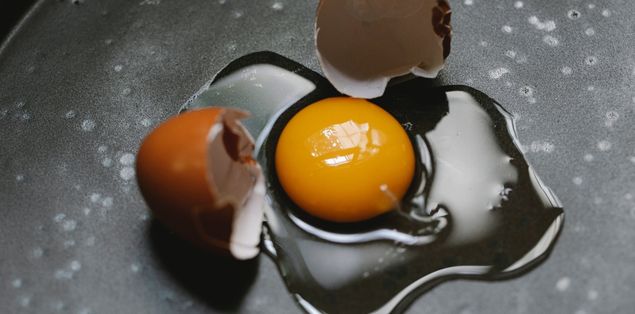
Chemical changes that occur when you fry an egg are generally not dangerous. However, new food products get created as a result of chemical modifications.
According to some scientists, fried eggs might cause detrimental chemical changes in your body. Even while deep-frying an egg isn’t necessarily terrible for us, it does rely on the cooking oil and how long it’s been cooked.
Several chemical changes may occur during the frying process that might be harmful or even cause cancer when ingested in large amounts. For example, depending on the kind of fat, the temperature at which these events occur may vary greatly in how quickly they occur.
At roughly 200 degrees Fahrenheit, most fats begin smoking, indicating the breakdown of hazardous compounds such as Acrolein and Glyoxal Derivatives, which are both proven carcinogens!
There are even traces of cholesterol in the smoke emitted when cooking oils are heated, showing that it is present in the oil itself.
Does Frying an Egg Cause Loss Of Important Compounds?
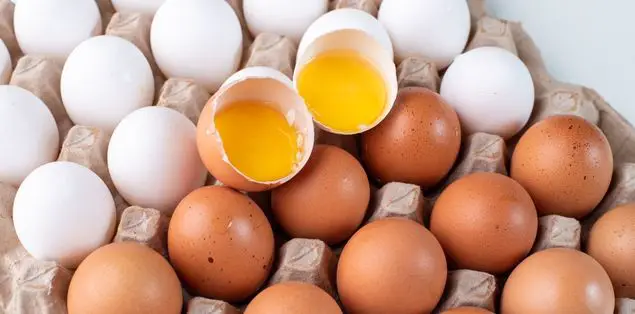
Yes.
A study just published in the Journal of Agriculture and Food Chemistry reveals that frying eggs results in the loss of xanthophyll found in egg yolks.
Xanthophyll are important bioactive chemicals that play an important part in various degenerative processes inside our bodies.
Fried eggs had 19.3% less xanthophyll content than their uncooked counterparts, according to a comprehensive experiment that researchers from the University of Alberta carried out. Similarly, the number of xanthophylls found in egg yolks was reduced by 22.5 percent when the eggs were boiled and by 16.7 percent when people microwaved them.
Is Boiling an Egg a Physical or Chemical Change?
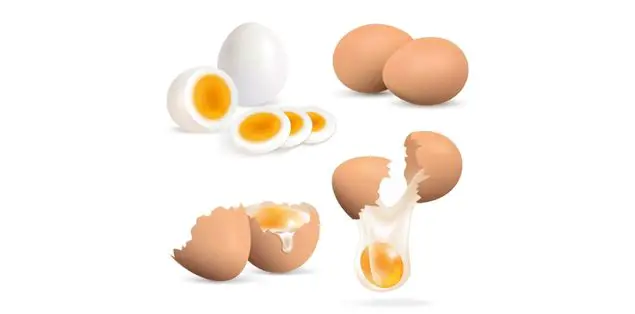
Chemical change.
Eggs change their chemical composition after you boil them. When you boil an egg, its chemical makeup gets permanently altered, and you cannot reverse this change.
A change that occurs physically is boiling water, which results in the formation of water vapor. The only change that has occurred is one in the condition of the substance; there has been no alteration in its chemical composition.
After you boil an egg at a high temperature, a chemical reaction occurs between the yolk and the white, resulting in a green film left around the yolk. You can see this when the egg is cooled. The formation of that film is known as iron sulfide, which is brought about when the iron in the yolk reacts with the hydrogen sulfide in the white.
Is Cracking an Egg a Physical or Chemical Change?

Physical change.
A change in the size or form of matter is an example of a physical change, which may also encompass other changes. For example, a change in physical state occurs when you crack an egg because the egg and the contents inside do not alter. However, due to the crack, the egg’s shell takes on a different form or look. Aside from that, there are also changes in state, such as vaporization and liquid.
The water in the egg evaporates, and this process determines the new chemical makeup of the egg.
Final Words
So, does the act of frying an egg causes a change in the egg’s chemical composition? The egg undergoes various chemical transformations due to the frying process. Hence, this is not a change only caused by physical forces. Therefore, we may conclude that frying is a chemical process. As a result, fried eggs undergo a chemical transformation from their raw state!
A fried egg’s properties differ from that of a normal cooked egg. Both have completely different chemical properties.
